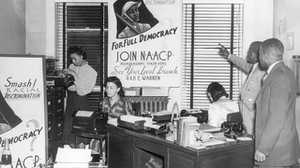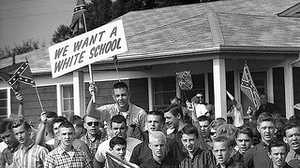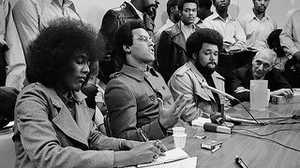A Woman Black Panther

Philadelphia native Elaine Brown rose through the Black Panther organization after she moved to Los Angeles in 1965. She later became the first woman to head the controversial, male-dominated organization.
Here she describes the appeal of the Black Panthers, her commitment to their ideology, and her impressions of Chicago Panther leader Fred Hampton, who would be murdered in his bed by Illinois law enforcement officers working together with the FBI.
by Elaine Brown
The [Black Panther] party reached out mostly to men, to young, black urban men who were on the streets, who knew that there were no options somewhere in their lives, who were gang members because that was all you could be in order to find some sense of dignity about yourself. We reached out to these people because we had something for them to do with the rest of their lives. In most cases, they were used to violence, they were used to struggle, they were used to fighting just to keep alive. We offered them the opportunity to make their lives meaningful. Huey [Newton] used to always quote [Chinese Communist leader] Mao in saying, "To die for the people is heavier than Mount Tai," meaning to die for nothing is lighter than a feather, but to die for the people is something heavy, something heavy in the sense of meaningful, weighty. And a lot of brothers did make their commitment with that conscious understanding that coming away from the gang was something that they were ultimately building for themselves and for their community.
I was denounced from some of the women's groups because the question of feminism seemed to not allow for this element, this return to the community of the black male. I had grown up in a neighborhood where there were two fathers that I could name off the top of my head, that we knew of, that were still in the home and married or whatever. Most people I knew, and most people in many black communities, had divorced parents long before these statistics were popular. The image that we had, at least, was the father wasn't there. Or the father didn't do this, or there was the black male who was the weak figure, and so forth.
It meant committing your life. I mean, that's how we saw it. It meant that we had to surrender up something of ourselves, our own lives, because we believed that the struggle that we were involved in, which we thought of as socialist revolution, would take our lives. And so we had to surrender that. We had to make a kind of commitment. Now, whether we realistically thought we would die, most of us, I think, did, after a time. So it meant surrendering our lives to something greater, which was the notion of getting rid of oppression, and all the things that oppression meant and means in this country for black people and other people in the country. It meant not involving yourself in your self and whatever you did as a human being, whatever you were about. It meant really seeing yourself as part of a whole, and part of an entire process, and that you were a soldier in the army. That's how we saw ourselves — as soldiers in the army, and an army that was about bringing a revolution, a vanguard army, as we considered ourselves, to introduce socialist revolution into the United States of America.
...The first thing you remember about Fred [Hampton] is that he was down in the trenches with everybody. And his house, that house on the West Side [of Chicago], was a horrible place to live. But he didn't live above, or elevate himself above. He lived like the rest of the comrades in the party, which was pretty poorly — except by that time, this unique thing was that big bed that he and [his girlfriend] Deborah [Johnson] had. Everybody laughed about the big bed that they had.
We got up with him in the morning. We had come in around two in the morning. He was up all night, which was apparently typical, and around six in the morning, we got out, we drove along to some schoolyard or something, and there were like two hundred, three hundred people waiting for Fred to show up. And the phenomenal part was that, I mean, these are all people from the streets, who are not going to get up and go to work, or anything else, and never had no discipline, and never would, but there they were. And it was six, six-thirty in the morning, freezing Chicago weather. And Fred would have them out there doing push-ups and jumping jacks and getting themselves energized for the day's work. Which included making the breakfast, which included selling papers, which included working in the medical clinic, which included a bunch of stuff. It was a very day-to-day thing, the Black Panther party.
You'd have Fred out there, rallying them. He'd say, "All right, al right, all right, power to the people!"
He'd say, "Now, I'm not going to die on no airplane."
Everybody'd say, "No."
"I'm not going to die slipping on some ice."
They'd say, "No."
He'd say, "I'm going to die for the people. Because I'm going to live for the people."
They'd say, "Right on."
He'd say, "I'm going to live for the people because I love the people."
They'd say, "Right on."
He'd say, "I love the people. Why?"
They'd say, "Because we're high on the people, because we're high on the people."
That was Fred Hampton. This was twenty-one years old. He was unbelievable. You could not not be moved by Fred Hampton. It was like Martin Luther King. You just had to see Fred Hampton mobilize people who wouldn't have moved for anything else that I could imagine on the planet, much less to get up and cook breakfast.
From Hampton, Henry, and Steve Fayer, Voices of Freedom: An Oral History of the Civil Rights Movement from the 1950s Through the 1980s (New York: Bantam Books, 1990), pp. 359, 371-372, 526-527.







